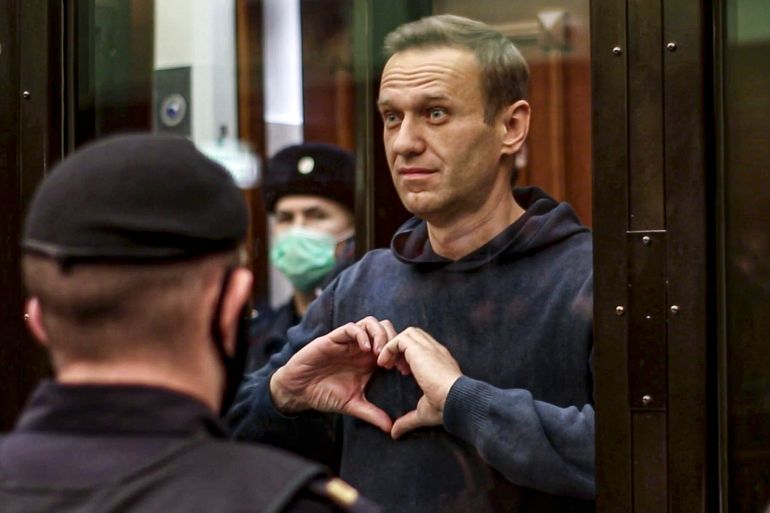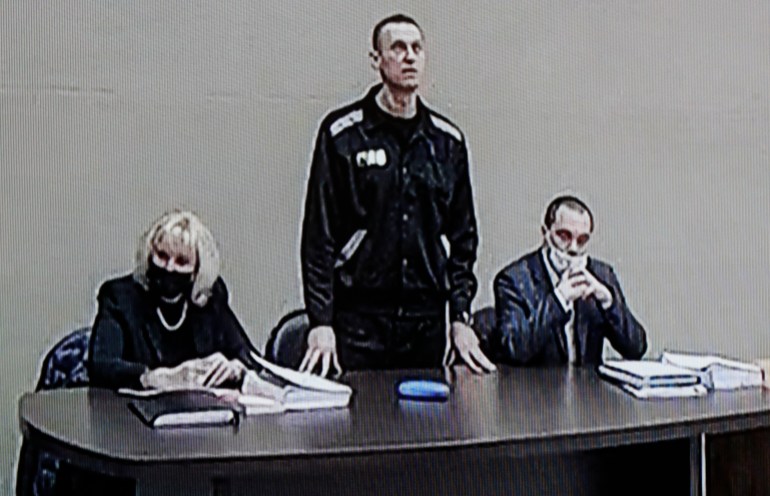Russian prosecutors seek new jail term for Kremlin critic Navalny
Navalny faces 13 years in jail, two years on probation and a $10,600 fine for embezzlement and contempt of court charges.

Russian prosecutors have called for jailed Kremlin critic Alexey Navalny to serve 13 years in prison on new embezzlement and contempt of court charges.
Navalny, President Vladimir Putin’s most vocal domestic critic, was jailed last year after surviving a poison attack he blames on the Kremlin. He is serving a two-and-a-half-year sentence.
Keep reading
list of 3 items‘Immense bravery’: Kremlin critic Navalny wins EU rights prize
Russia adds jailed Kremlin critic Navalny to list of ‘terrorists’
It was not immediately clear if the 13 years include the sentence he is currently serving.
His corruption charges carry a maximum penalty of 10 years, while contempt of court is punishable by up to six months.
“I request that Navalny be sentenced to a term of 13 years and a subsequent two years of probation,” prosecutor Nadezhda Tikhonova was quoted as saying by Russian news agencies.
The prosecutor also requested “two years of restricted freedom” for Navalny and that he pay a fine of 1.2 million roubles ($10,600).

A key Navalny aide and former head of his regional offices, Leonid Volkov, said that Russia is seeking to keep Navalny jailed for life.
“He was sentenced to life from the very start. So long as Putin is still in the Kremlin,” Volkov said on Twitter.
Navalny’s spokeswoman Kira Yarmysh said his sentence depends on “how long Putin is in power”.
Calls to protest
“Then, we will do everything so that he doesn’t stay in power long,” Yarmysh said.
Investigators accuse Navalny of stealing for personal use several million dollars worth of donations that were given to his political organisations.
Before he was jailed, Navalny was Russia’s main opposition leader and his team frequently published investigations into the wealth of Russia’s elites that garnered millions of views on YouTube.
Navalny’s poisoning in 2020 with a nerve agent and arrest on his return from rehabilitation in Germany last year sparked widespread condemnation abroad, as well as sanctions from Western capitals.
After his arrest, Navalny’s political organisations across the country were declared “extremist” and shut down, while many key aides fled Russia fearing prosecution.
Crackdown on media
Russia has also ramped up its pressure on independent media and NGOs with many declared foreign agents or shut down under fear of prosecution.
A string of closures followed after Russia passed a new law introducing up to 15 years in jail for “fake news” about what Russia calls its military operation in Ukraine.
In an effort to further control the information available to its domestic audience about the Ukraine conflict, Russia restricted access to Twitter, Facebook and Instagram this month, and has blocked the websites of several independent news outlets.
On Instagram, Navalny has denounced Russia’s incursion into Ukraine and called on his supporters to protest despite the high likelihood of fines and arrest.
During the past two weeks, close to 15,000 people have been detained at Ukraine demonstrations across Russia, according to independent monitor OVD-Info.